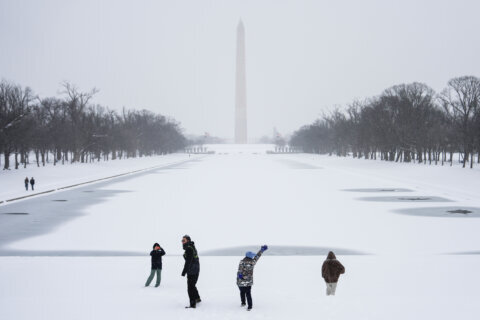A burst pipe is never a good thing, and as temperatures in the D.C. area are expected to drop even more in the coming days, here are a few tips on what you can do to avoid a mess this holiday season.
If the pipes in your home freeze and get backed up when it’s cold, you could have a major issue on your hands.
“Sometimes it can be a very large leak, a half inch copper pipe, for example, can discharge 10 or 12 gallons a minute, once it cracks,” said Art Shapiro, acting director of the Howard County Department of Public Works.
He said that if you’re leaving for the holidays, you should prepare ahead of time.
“It’s always a good idea to turn off the incoming water supply in your home. And by doing so, you are preventing the potential of uncontrolled water being discharged,” he said.
If you’re staying home, he said to turn the faucets on, and let a stream of water the diameter of a pencil come out of a tap furthest away from where your water comes into the home. Keep that running until the temperatures outside are above freezing.
“You’re sacrificing a few gallons of water, but in exchange avoiding the tremendous costs that can be incurred by frozen water pipes left running,” Shapiro said.
He said that there are some simple steps you can take that aren’t very expensive.
“There are precautionary steps that every homeowner can take that make sense and are achievable without having to go through a lot of expense,” he said.
Shapiro said you can wrap or insulate exposed pipes that are susceptible to freezing temperatures.
“Heat taping, that’s essentially an electric cable, which is designed to be strapped to an exposed pipe. It’s an automatic heater for an exposed piece of plumbing,” Shapiro said.
He said you can get that and other insulation products at your local hardware store.
“It’s very easy to do. It requires no tools. And it’s actually very inexpensive,” he said.
Here are a few more tips D.C. Water recommends to prevent and treat frozen pipes:
To prevent frozen pipes:
- Eliminate sources of cold air near pipes by sealing drafty windows and doors and insulating walls and attics.
- If pipes are exposed to cold air, wrap them with insulation, or even newspaper will help.
- Keep water moving through pipes by turning on the faucet farthest from your main valve to a very small, steady trickle.
- Run warm water through your pipes if you begin to see a decrease in water pressure, to loosen any ice that may be forming within your pipes.
- Keep pipes that are in cabinets and vanities warmer by opening the doors to those cabinets to let warm air in.
If pipes freeze:
- If you have a frozen pipe, first, locate and shut off the main water supply valve, in case a pipe has broken.
- Next, open the faucet so that water will flow through the pipe once the area is melted. This will help melt more ice.
- Then, gently apply heat with a hairdryer around the pipe. Keep all sources of heat away from flammable materials and do not use any open-flame devices. Also, do not use devices that will cause the melted ice to boil, as that can also cause pipes to break.
- Call a licensed plumber if you cannot locate the frozen section, if you are unable to reach it or unable to thaw it.
- Check for other frozen pipes in your home or business, especially those along an exterior wall or that bring the water into the building at the foundation.
- Once you have thawed the frozen area, check the pipes for leaks to make sure the ice did not cause any cracks or damage.
For pipes outside your home:
- Be aware, the service line that runs from the meter outside your home to your indoor plumbing is considered private property and is the owner’s responsibility. If you believe you have a problem on the private-side service line, contact a licensed and registered plumber.
- The water mains that carry water to service lines are highly pressurized and fast-moving, and therefore extremely unlikely to freeze.








